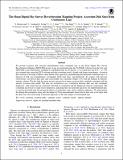Files in this item
The Sloan Digital Sky Survey Reverberation Mapping Project : accretion disk sizes from continuum lags
Item metadata
| dc.contributor.author | Homayouni, Y. | |
| dc.contributor.author | Trump, Jonathan R. | |
| dc.contributor.author | Grier, C. J. | |
| dc.contributor.author | Shen, Yue | |
| dc.contributor.author | Starkey, D. A. | |
| dc.contributor.author | Brandt, W. N. | |
| dc.contributor.author | Alvarez, G. Fonseca | |
| dc.contributor.author | Hall, P. B. | |
| dc.contributor.author | Horne, Keith | |
| dc.contributor.author | Kinemuchi, Karen | |
| dc.contributor.author | Li, Jennifer I-Hsiu | |
| dc.contributor.author | McGreer, Ian D. | |
| dc.contributor.author | Sun, Mouyuan | |
| dc.contributor.author | Ho, L. C. | |
| dc.contributor.author | Schneider, D. P. | |
| dc.date.accessioned | 2019-09-02T15:30:07Z | |
| dc.date.available | 2019-09-02T15:30:07Z | |
| dc.date.issued | 2019-08-01 | |
| dc.identifier | 260976111 | |
| dc.identifier | fdfe645e-d9bd-4d0a-83c8-d32005978903 | |
| dc.identifier | 85071879920 | |
| dc.identifier | 000479029300008 | |
| dc.identifier.citation | Homayouni , Y , Trump , J R , Grier , C J , Shen , Y , Starkey , D A , Brandt , W N , Alvarez , G F , Hall , P B , Horne , K , Kinemuchi , K , Li , J I-H , McGreer , I D , Sun , M , Ho , L C & Schneider , D P 2019 , ' The Sloan Digital Sky Survey Reverberation Mapping Project : accretion disk sizes from continuum lags ' , Astrophysical Journal , vol. 880 , no. 2 , 126 . https://doi.org/10.3847/1538-4357/ab2638 | en |
| dc.identifier.issn | 1538-4357 | |
| dc.identifier.other | RIS: urn:F54728DEF45EE889CF5D979DDF76FC67 | |
| dc.identifier.uri | https://hdl.handle.net/10023/18404 | |
| dc.description | K.H. acknowledges support from STFC grant ST/R000824/1 | en |
| dc.description.abstract | We present accretion disk structure measurements from continuum lags in the Sloan Digital Sky Survey Reverberation Mapping (SDSS-RM) project. Lags are measured using the JAVELIN software from the first-year SDSS-RM g and i photometry, resulting in well-defined lags for 95 quasars, 33 of which have lag S/N > 2σ. We also estimate lags using the ICCF software and find consistent results, though with larger uncertainties. Accretion disk structure is fit using a Markov chain Monte Carlo approach, parameterizing the measured continuum lags as a function of disk size normalization, wavelength, black hole mass, and luminosity. In contrast with previous observations, our best-fit disk sizes and color profiles are consistent (within 1.5σ) with the Shakura & Sunyaev analytic solution. We also find that more massive quasars have larger accretion disks, similarly consistent with the analytic accretion disk model. The data are inconclusive on a correlation between disk size and continuum luminosity, with results that are consistent with both no correlation and the Shakura & Sunyaev expectation. The continuum lag fits have a large excess dispersion, indicating that our measured lag errors are underestimated and/or our best-fit model may be missing the effects of orientation, spin, and/or radiative efficiency. We demonstrate that fitting disk parameters using only the highest-S/N lag measurements biases best-fit disk sizes to be larger than the disk sizes recovered using a Bayesian approach on the full sample of well-defined lags. | |
| dc.format.extent | 2162239 | |
| dc.language.iso | eng | |
| dc.relation.ispartof | Astrophysical Journal | en |
| dc.subject | Accretion, accretion disks | en |
| dc.subject | Galaxies: active | en |
| dc.subject | Galaxies: nuclei | en |
| dc.subject | Quasars: general | en |
| dc.subject | QB Astronomy | en |
| dc.subject | NDAS | en |
| dc.subject.lcc | QB | en |
| dc.title | The Sloan Digital Sky Survey Reverberation Mapping Project : accretion disk sizes from continuum lags | en |
| dc.type | Journal article | en |
| dc.contributor.sponsor | Science & Technology Facilities Council | en |
| dc.contributor.institution | University of St Andrews. School of Physics and Astronomy | en |
| dc.contributor.institution | University of St Andrews. St Andrews Centre for Exoplanet Science | en |
| dc.identifier.doi | 10.3847/1538-4357/ab2638 | |
| dc.description.status | Peer reviewed | en |
| dc.identifier.url | https://arxiv.org/abs/1806.08360 | en |
| dc.identifier.grantnumber | ST/R00824/1 | en |
This item appears in the following Collection(s)
Items in the St Andrews Research Repository are protected by copyright, with all rights reserved, unless otherwise indicated.

